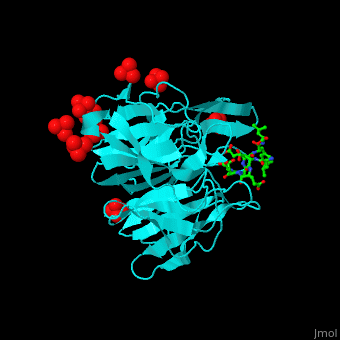Kelch-like protein
From Proteopedia
(Difference between revisions)
| (4 intermediate revisions not shown.) | |||
| Line 1: | Line 1: | ||
| - | <StructureSection load=' | + | <StructureSection load='' size='450' side='right' caption='Human Kelch-like protein 1 (Keap1) Kelch domain (cyan) complex with NRF2 Neh2 peptide (green) and sulfate (PDB code [[1x2r]])' scene='70/706701/Cv/1'> |
== Function == | == Function == | ||
| - | '''Kelch-like proteins''' (KLHL) contain multiple Kelch motifs. This motif is about 50 residues long and forms a four-stranded β-sheet blade. <scene name='70/706701/Cv/ | + | '''Kelch-like proteins''' (KLHL) contain multiple Kelch motifs. This motif is about 50 residues long and forms a four-stranded β-sheet blade. <scene name='70/706701/Cv/6'>Six to eight such blades form a circular β-propeller domain</scene>. β-propellers are involved in protein-protein interactions. The N-terminal of KLHL contains other protein domains like BTB (Broad-Tramtrack-Bric-a-brac) which is also involved in protein-protein interactions<ref>PMID:23676014</ref>.<br /> |
| - | + | ||
*'''KLHL2''' '''KLHL11''' is a component of the cullin-RING based E3 ubiquitin-protein ligase system.<br /> | *'''KLHL2''' '''KLHL11''' is a component of the cullin-RING based E3 ubiquitin-protein ligase system.<br /> | ||
*'''KLHL3''' and '''KLHL7''' '''KLHL10''' are substrate-specific adapters of the cullin-RING based E3 ubiquitin-protein ligase system.<br /> | *'''KLHL3''' and '''KLHL7''' '''KLHL10''' are substrate-specific adapters of the cullin-RING based E3 ubiquitin-protein ligase system.<br /> | ||
| Line 16: | Line 15: | ||
== Structural highlights == | == Structural highlights == | ||
| - | The <scene name='70/706701/Cv/ | + | The <scene name='70/706701/Cv/7'>interaction of Keap1 with Neh2 is through the first Glu in the latter's ETGE motif</scene><ref>PMID:16507366</ref>. <scene name='70/706701/Cv/8'>All interactions of Keap1 with Neh2</scene>. Water molecules shown as red spheres. |
| - | + | ||
| - | + | ||
== 3D Structures of Kelch-like protein == | == 3D Structures of Kelch-like protein == | ||
| + | [[Kelch-like protein 3D structures]] | ||
| - | + | </StructureSection> | |
| - | + | ||
| - | + | ||
| - | + | ||
| - | + | ||
| - | + | ||
| - | + | ||
| - | + | ||
| - | + | ||
| - | + | ||
| - | + | ||
| - | + | ||
| - | + | ||
| - | + | ||
| - | + | ||
| - | + | ||
| - | + | ||
| - | + | ||
| - | + | ||
| - | + | ||
| - | + | ||
| - | + | ||
| - | + | ||
| - | + | ||
| - | + | ||
| - | + | ||
| - | + | ||
| - | + | ||
| - | + | ||
| - | + | ||
| - | + | ||
| - | + | ||
| - | + | ||
| - | + | ||
| - | + | ||
| - | + | ||
| - | + | ||
| - | + | ||
| - | + | ||
| - | + | ||
| - | + | ||
| - | + | ||
| - | + | ||
| - | + | ||
| - | + | ||
| - | + | ||
| - | + | ||
| - | + | ||
| - | + | ||
| - | + | ||
| - | + | ||
| - | + | ||
| - | + | ||
| - | + | ||
| - | + | ||
| - | + | ||
| - | + | ||
| - | + | ||
| - | + | ||
| - | + | ||
| - | + | ||
| - | + | ||
| - | + | ||
| - | + | ||
| - | + | ||
| - | + | ||
| - | + | ||
| - | + | ||
| - | + | ||
| - | + | ||
| - | + | ||
| - | + | ||
| - | + | ||
| - | + | ||
| - | + | ||
| - | + | ||
| - | + | ||
| - | + | ||
| - | + | ||
== References == | == References == | ||
<references/> | <references/> | ||
[[Category:Topic Page]] | [[Category:Topic Page]] | ||
Current revision
| |||||||||||
References
- ↑ Dhanoa BS, Cogliati T, Satish AG, Bruford EA, Friedman JS. Update on the Kelch-like (KLHL) gene family. Hum Genomics. 2013 May 15;7:13. doi: 10.1186/1479-7364-7-13. PMID:23676014 doi:http://dx.doi.org/10.1186/1479-7364-7-13
- ↑ Padmanabhan B, Tong KI, Ohta T, Nakamura Y, Scharlock M, Ohtsuji M, Kang MI, Kobayashi A, Yokoyama S, Yamamoto M. Structural basis for defects of Keap1 activity provoked by its point mutations in lung cancer. Mol Cell. 2006 Mar 3;21(5):689-700. PMID:16507366 doi:10.1016/j.molcel.2006.01.013

